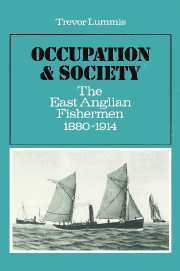Book contents
- Frontmatter
- Contents
- List of figures and tables
- Acknowledgements
- Map
- Introduction
- PART ONE OCCUPATIONAL STRUCTURE
- PART TWO THE SOCIAL STRUCTURE
- PART THREE THE FAMILY, SOCIAL PRACTICE AND BELIEF
- Introduction
- 9 Female waged labour
- 10 Domestic life
- 11 Leisure
- 12 Religion: practice and belief
- 13 Community and conclusion
- Appendix: supplementary information on the interviews
- Glossary
- Notes
- Bibliography and sources
- Index
13 - Community and conclusion
Published online by Cambridge University Press: 22 October 2009
- Frontmatter
- Contents
- List of figures and tables
- Acknowledgements
- Map
- Introduction
- PART ONE OCCUPATIONAL STRUCTURE
- PART TWO THE SOCIAL STRUCTURE
- PART THREE THE FAMILY, SOCIAL PRACTICE AND BELIEF
- Introduction
- 9 Female waged labour
- 10 Domestic life
- 11 Leisure
- 12 Religion: practice and belief
- 13 Community and conclusion
- Appendix: supplementary information on the interviews
- Glossary
- Notes
- Bibliography and sources
- Index
Summary
What has been related about fishwives in Scotland applies almost equally well to those in England and France during the last century. They ruled their husbands in just the same way, and kept a firm hold of the money.
Anson 1965The final review of the argument introduces some new material on community because one of the major conclusions to emerge from the study is that non-work and pre-work experience is as fundamental a location of class experience and attitudes as is occupational experience. The importance of non-work experience became manifest almost by default as aspects of the fishermen's consciousness could not be convincingly located in their industrial experience. Their working-class identity and values are unexceptional and it might be urged that they could hardly hold any other perspective given the totality of the society in which they lived. But it is the very pervasiveness of class experience which raises the question as to how it is founded and sustained.
Emphasis on the non-work dimension is not intended to in any way devalue or replace the workplace as the major location of class conflict. Industrial struggles have been the major source of class solidarity and political struggle. Indeed, attempts to politicise industrial struggle and resistance to this has been a continuous thread in trade union history. But, apart for one section of the industry for a brief period, the East Anglian fishermen did not have a trade union and they were politically apathetic.
- Type
- Chapter
- Information
- Occupation and SocietyThe East Anglian Fishermen 1880-1914, pp. 161 - 172Publisher: Cambridge University PressPrint publication year: 1985
- 1
- Cited by



